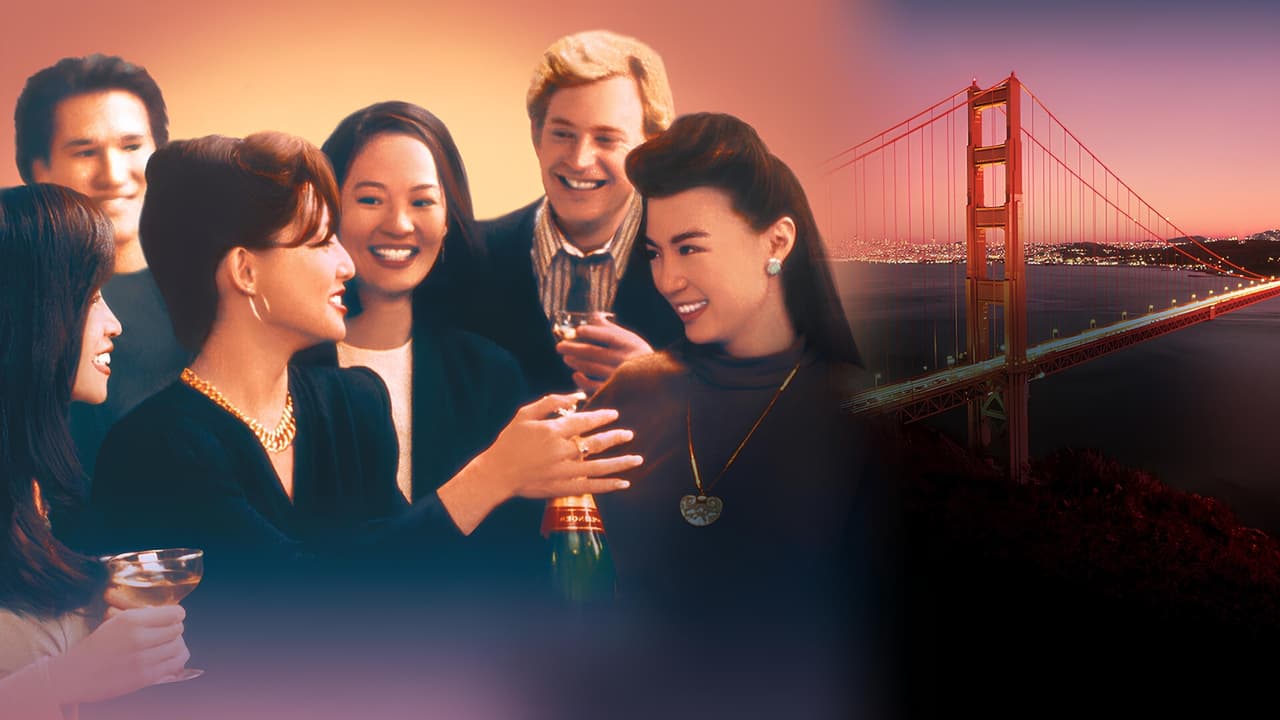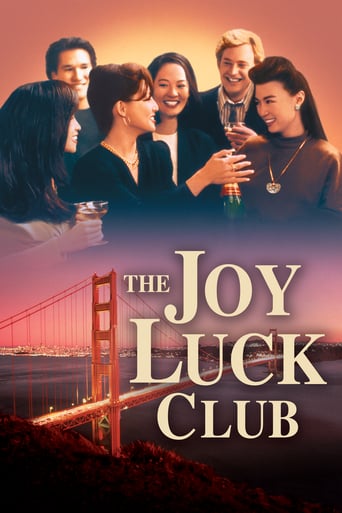

Excellent, a Must See
... View MoreDid you people see the same film I saw?
... View MoreAll of these films share one commonality, that being a kind of emotional center that humanizes a cast of monsters.
... View MoreStrong acting helps the film overcome an uncertain premise and create characters that hold our attention absolutely.
... View MoreFour women from China formed the Joy Luck Club in San Francisco. One of them Suyuan Woo passes away leaving a secret in China for her daughter June. Suyuan had left two babies behind during the war. The others of the club have their own secrets which affect each of their daughters. Lindo was forced into an arranged marriage and her daughter Waverly Jong struggles for her approval. Ying-Ying had a womanizing husband and she does something horrific. She finds herself without soul to pass onto her daughter Lena who struggles without respect from her husband. An-Mei's mother was disowned by her family and forced to be the fourth wife of a brutal man. An-Mei's daughter Rose Hsu is married to Ted Jordan (Andrew McCarthy) but their marriage is floundering.This is a movie about and probably for mothers and daughters. The complicated relationships are touching. It is a lot and maybe too many stories. It leaves the movie with an anthology feel. Some of them are really compelling. These are interesting stories portrayed by actors who are rarely used as leads during 90's Hollywood.
... View MoreThis movie was one of the first successful Hollywood movies that featured mostly Asian American characters. However, years from now it will ultimately end up seen in a negative light. This movie perpetuates White Knight archetypes along the same veins as Dances with Wolves, Last Samurai, and even Avatar, in which White males are positioned as the saviors for (backwards) foreigners.The author Amy Tan is a self-loathing, Uncle Tom writer. She never lived in Asia, exoticizes Chinese and Asian cultures, and improperly interprets Chinese terms and behaviors in all of her works. Her core reader demographic are White Americans who enjoy consuming self-righteous or superiority complex attitudes toward other cultures. Amy Tan, and other "White worshiping" Asian Americans like her (like Michelle Malkin), ultimately enjoy success and acceptance in America by pandering, or by demonizing Asian males.In terms of other identity or 2nd-generation American immigrant movies, one hardly sees Indian, Middle Eastern, South American, or other males portrayed in movies/books as negatively as Amy Tan portrays Asian males in all of her works. It also perpetuates damaging (and false) stereotypes regarding Asians and gender roles. When one looks at 2nd class status in Western religions, the lives of American women during the same time period, or the lower percentages of women in current political or corporate offices in America compared to China, the damaging stereotypes seem even more absurd.
... View MoreI'd read many books by Chinese, and Asian-American authors before, but though some of them touched something in me, I didn't really understand a lot of what they said. I knew I needed a better understanding of the cultural differences, but boy! what a gap!!!I've lived in Taiwan now for 5 years, and still have a lot to learn about the "inner fires and mysteries" that push and nudge these people to their choices. Choices I make, too but from a somewhat different outlook. So I caught the Joy Luck Club on the Starmovies channel... and laughed and sobbed, and felt so full I could burst and desolate, and loved, and neglected. All at once. Wow! What a ride! And for Pete's sake, I'm a 40-year old guy! (And no, I'm happily married!)I don't care that some posters are heartless enough to pare people down to "cliches" (ugly word, that.. yuck) in order to be able to make sense of the movie. It's their tough luck that they are missing out on the richness of life - a life that is portrayed so very well and so deeply by the smallest actions of the actors, and their words! A feather to you Amy Tan and Ronald Bass for some of the most stunning lines written for the screen!Go get the movie, folks.
... View MoreOn my first viewing, this film got a "fair" rating because there were not enough memorable roles and the story was confusing to me. I lost track of which person was telling their particular story at the moment. (There are eight stories woven into this two hour, 19 minute movie). I think it would be confusing to most one-time viewers to get confused here if you don't know the stories or the actors. It also got a little soap-opera-ish, too, but then again, this film was based on a best-selling book that was ready primarily by women.On the second viewing, almost two years later, I liked it a lot more and upgraded my "star" rating considerably. It's still a "chick flick" and a feminist one. The young women are that way, the Americanized women, while their mothers, those all born in China, are quite. The older ladies are a bit too strict and their daughters are a bit too liberal. That included general morals and language - a big difference between the two generations and cultures. The feminist angle I didn't like was that in almost every relationship the man is painted as the bad guy (the abuser, the non-loving type, etc.) That kind of story bias was too much.The more memorable of the stories turned out to be the ones with the older women, such as the one who left her two babies at the base of a tree, or the one who had to marry a young boy.For me, the best part of the film was the cinematography. There were some beautiful scenes and great colors: bright oranges, yellows, reds and browns. Some of the young women were beautiful, too. The lady narrating in the beginning, "June" (Melanie Chang as a nine-year- old and then Ming-Na as an adult) was very appealing and had a great voice. Her story is the one that begins and ends the film. That ending, by the way, is almost guaranteed to bring a few tears.Overall, a wonderful visual movie and a great venue for Chinese-American actresses, all of whom I found fascinating to watch.
... View More